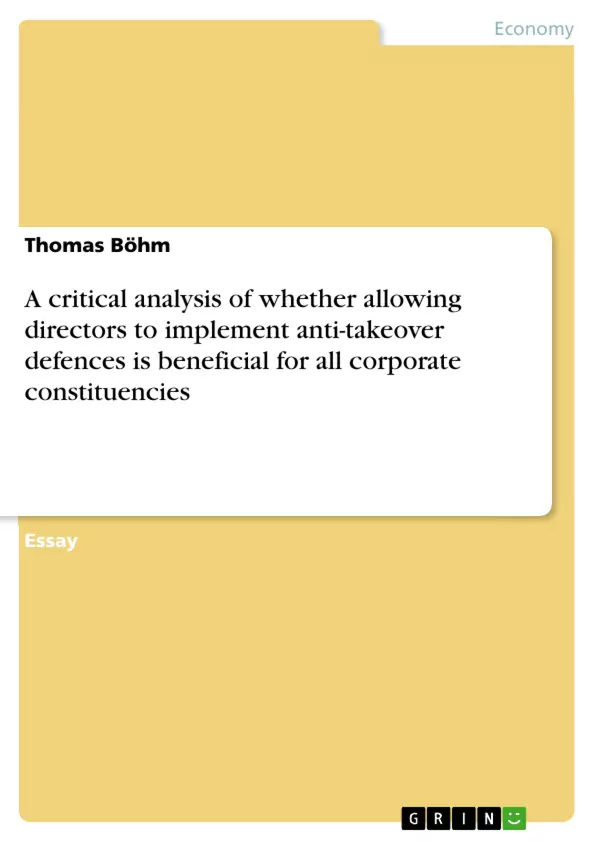This essay examines the question whether allowing directors to implement anti-takeover defences is beneficial for all corporate constituencies. Beginning with the classification of the topic in the law and economics context of the market for corporate control in Chapter 2, I will briefly outline in Chapter 3 the scenarios in which anti-takeover defences usually come into operation, namely hostile takeovers. Chapter 4 presents the most common anti-takeover defences and sets out the legal framework to what extent directors are permitted to adopt such defences in accordance with the applicable law. A distinction is made between UK and US law, with the latter focussing on Delaware law, where more than a half of all US publicly traded corporations are established. The Delaware Court of Chancery and Supreme Court have developed an extraordinary body of jurisprudence concerning corporate takeovers and anti-takeover defences. Chapter 5 points out potential impacts on the various constituencies of a company and deals with the fact why their interests have to be regarded in the takeover context. Finally, Chapter 6 critically evaluates anti-takeover defences from different stakeholder perspectives and concludes that these are not beneficial for all corporate constituencies, but for directors only.
Inhaltsverzeichnis (Table of Contents)
- Introduction
- The Market for Corporate Control
- Hostile Takeovers
- Anti-Takeover Defences
- Common Types of Anti-Takeover Defences
- Defensive Capabilities of UK and US Companies
- Corporate Constituencies in the Takeover Context
- Affected Corporate Constituencies
- Legal Consideration of Stakeholder Interests
- Are Anti-Takeover Defences Beneficial for All Corporate Constituencies?
- Directors' Perspective
- Shareholders' Perspective
- Remaining Stakeholders' Perspective
- Conclusion
Zielsetzung und Themenschwerpunkte (Objectives and Key Themes)
This Essay examines the question whether allowing directors to implement anti-takeover defences is beneficial for all corporate constituencies. It analyzes the market for corporate control, hostile takeovers, common anti-takeover defences, and the legal frameworks in both the UK and US. The essay then delves into the potential impacts on various corporate constituencies, considering the legal considerations of stakeholder interests in the context of takeovers.
- The Market for Corporate Control and its role in corporate governance
- The use of anti-takeover defences in hostile takeovers
- The legal framework governing anti-takeover defences in the UK and US
- The impact of anti-takeover defences on different corporate constituencies
- The benefits and drawbacks of anti-takeover defences for various stakeholders
Zusammenfassung der Kapitel (Chapter Summaries)
- Chapter 2: The Market for Corporate Control: This chapter introduces the concept of the market for corporate control, explaining how companies are acquired and sold through takeovers or mergers and acquisitions. It discusses the potential benefits and drawbacks of takeovers, including the creation of value through synergies and the risk of value destruction due to cultural incompatibility or managerial misconduct.
- Chapter 3: Hostile Takeovers: This chapter briefly outlines the scenarios in which anti-takeover defences typically come into play, focusing on hostile takeovers. It sets the stage for the subsequent discussion of anti-takeover defences by explaining the context in which they are deployed.
- Chapter 4: Anti-Takeover Defences: This chapter delves into the most common types of anti-takeover defences, including poison pills, staggered boards, supermajority voting requirements, change of control clauses, golden parachutes, white knights and white squires, director removal for cause, restructuring, and the "just say no" approach. It examines the legal framework surrounding the implementation of these defences in both the UK and US, with a particular focus on Delaware law.
- Chapter 5: Corporate Constituencies in the Takeover Context: This chapter explores the potential impacts of takeovers on different corporate constituencies, including shareholders, directors, employees, creditors, and the community. It highlights the importance of considering the interests of all stakeholders in the takeover context.
- Chapter 6: Are Anti-Takeover Defences Beneficial for All Corporate Constituencies?: This chapter critically evaluates anti-takeover defences from the perspectives of directors, shareholders, and other stakeholders. It examines the arguments for and against the use of these defences, assessing whether they truly benefit all corporate constituencies or primarily serve the interests of directors.
Schlüsselwörter (Keywords)
The key concepts explored in this essay include the market for corporate control, hostile takeovers, anti-takeover defences, shareholder primacy, director primacy, corporate constituencies, stakeholder interests, and the benefits and drawbacks of anti-takeover defences for different stakeholders.
Frequently Asked Questions
What are anti-takeover defences?
These are strategies used by a company's board of directors to prevent or discourage a hostile takeover by another firm.
What is a "hostile takeover"?
A hostile takeover occurs when an acquiring company attempts to take over a target company against the wishes of the target's management or board.
What is a "poison pill"?
A poison pill is a common defensive tactic that makes the target company's stock less attractive or more expensive to the acquirer.
How do UK and US laws differ regarding takeover defences?
UK law generally follows a "no-frustration" rule, giving more power to shareholders, while US law (especially in Delaware) allows directors more discretion to implement defences.
Are these defences beneficial for shareholders?
The essay critically evaluates this and concludes that while they may benefit directors, they often do not serve the best interests of shareholders or other stakeholders.
Which corporate constituencies are affected by takeovers?
Key stakeholders include directors, shareholders, employees, creditors, and the local community.
- Citar trabajo
- Ass. Jur. Thomas Böhm (Autor), 2018, A critical analysis of whether allowing directors to implement anti-takeover defences is beneficial for all corporate constituencies, Múnich, GRIN Verlag, https://www.grin.com/document/480619



